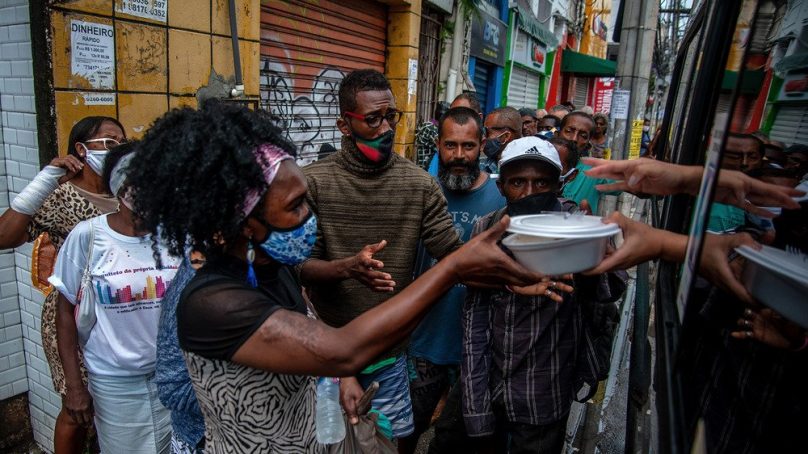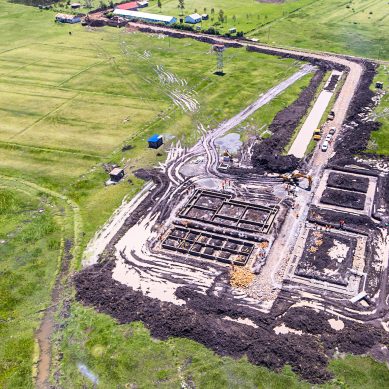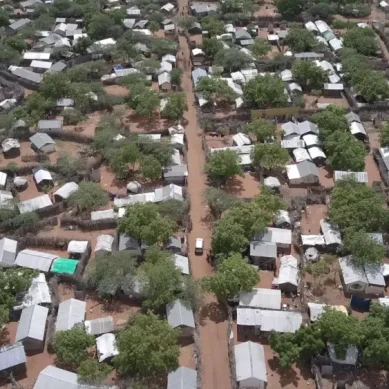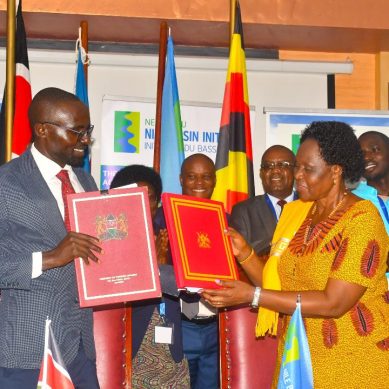
Not long ago hailed for its exemplary efforts to reduce hunger, Brazil is seeing a marked deterioration in its food security indicators as the economic fallout of Covid-19 deepens and a growing number of people struggle to afford a nutritional diet amid government aid cuts.
Considered an upper middle-income country, Brazil was removed in 2014 from the World Food Programme’s Hunger Map after a decade of progress in reducing hunger. But less than seven years later, more than half its 212 million population is grappling with some level of food insecurity – and almost one in 10 with serious hunger.
“With more than 19 million people facing serious food insecurity, the ‘yellow [warning] light’ has been turned on,” Daniel Balaban – director of the Centre of Excellence against Hunger, and the WFP’s representative in Brazil – said.
To be placed on the WFP’s Hunger Map, a country must have at least five per cent of its population facing serious food insecurity. With nine per cent of Brazil’s population now in that category, “we can say that the country is effectively back on the map”, said Balaban.
Because Brazil’s IBGE census bureau hasn’t officially released the latest data – there is no scheduled date for that release – the map can’t yet be updated to reflect this, he explained.
For Eliana Macedo, the economic effects of the pandemic struck when the families whose houses she cleaned suspended her services, afraid of letting outsiders into their homes.
After receiving four months of emergency financial aid from the government in 2020, the 44-year-old single mother of two – who lives in a poor community in Salvador, the capital of Brazil’s north-eastern state of Bahia – now gets by on charity food aid.
“Hunger is blind; it’s ugly and it hurts,” she said. “You wake up in the morning, look for a piece of bread to give to your child, and you don’t have any. It’s already noon and he’s crying from hunger, and you don’t have anything to give him. It’s very bad.”
Like many hungry families across Brazil, Macedo receives support from the Unified Centre of Favelas, or CUFA, a grassroots organisation created by young slum-dwellers to promote development.
In response to growing needs due to the economic impacts of Covid-19, CUFA launched a campaign to raise funds to purchase food for those in need: It now operates in over 5,000 slum communities around the country, helping over six million people in all 27 Brazilian states.
“This is the first time we have campaigned for emergency relief. We never went to the streets [before] asking for money, food or hygiene items. This is the first time we are doing a campaign like this, because the situation is critical,” said CUFA’s national president, Francisco Jose Pereira de Lima, known as Preto Zezé.
Brazil received plaudits in 2014 when the global hunger report compiled by the UN’s Food and Agriculture Organization (FAO) revealed that the number of undernourished Brazilians had fallen by more than 80 per cent in 10 years. The Brazilian government was praised for its “Zero Hunger” campaign, which made eradicating extreme poverty and hunger a cornerstone of its social and economic policies.
But between 2014 and 2019, food insecurity grew faster in Latin America and the Caribbean than anywhere else in the world – surging from 22.9 per cent to 31.7 per cent “due to a sharp rise in South America”, according to the FAO.
The FAO’s 2021 report indicates that although Brazil still has better indicators than the Latin American average, its situation has deteriorated in the last four years, and more sharply still since Covid-19 arrived last year.
A March 2021 study on the effects of the pandemic – conducted by Brazilian research NGO PENSSAN – showed that about 116 million Brazilians, or 54 percent of the population, faced some level of food insecurity in 2020.
Fátima Cassanti, general coordinator from 2004-2008 of the Promotion of Food and Nutrition Programmes – a key part of implementing the Zero Hunger policy – said the government used to provide emergency food packages, constructed community water cisterns, partnered with restaurants to offer meals for R$1.00 ($ 0.20) and created community kitchens in the favelas.
“At the time, there was a strong political desire that every Brazilian have access to three meals a day,” Cassanti said. “Whenever there is a political will, things start to happen.”
During its first year, according to Cassanti, R$100 million ($19.24 million) was earmarked for the programme and disbursed in 2004. According to federal budget data, the government set aside over R$1 billion ($192.4 million) for Zero Hunger between 2004 and 2007. In parallel, the government increased the minimum wage and created the Bolsa Familia programme, offering support to families to keep their children in school.
But in 2015, aid groups working on food insecurity in the country began to see an increase in the number of Brazilians going hungry. Amid the political crisis of President Dilma Rousseff’s second term and the arrival of a global mini-recession in 2015, the federal government failed to adopt a series of key social protection policies, said Denise Oliveira e Silva, a researcher at Fiocruz, one of Brazil’s main public research institutions.
Those social safety nets were further weakened in subsequent years – during the administration of Michel Temer and, more recently, under President Jair Bolsonaro, who took office in January 2019.
“What are the first measures that Bolsonaro takes? To remove the National Council for Food and Nutrition Security (CONSEA) and other social protection policies,” said Oliveira e Silva.
Those changes led to an increase in both severe and moderate food insecurity, according to Rosana Salles-Costa, a professor of nutrition at the Federal University of Rio de Janeiro (UFRJ), and also a researcher at PENSSAN.
- The New Humanitarian report








